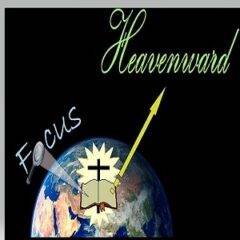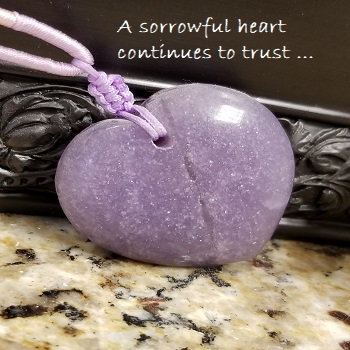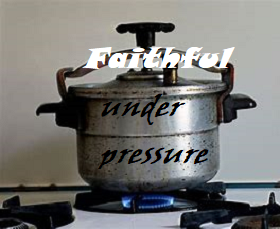As we near the end of the first chapter in Ruth, Orpah has returned back to Moab and Naomi and Ruth begin their journey on to Bethlehem. After much persuasion on Naomi’s part for Ruth to return to her own family, Ruth makes it perfectly clear she will accompany Naomi, adopt her culture, her people and her God. We are not given information about the actual trek through desert land yet we can imagine it was not an easy journey. However they did make it and verse nineteen picks up with the two women arriving in Bethlehem. Once they entered the town, people gathered as they recognized Naomi.
Ruth 1:19 So they both went until they came to Bethlehem. And when they had come to Bethlehem, all the city was stirred because of them, and the women said, "Is this Naomi?"
Recall, Naomi had been gone for about ten years. Her family must have been known for her name to be remembered. As Naomi and Ruth approach Bethlehem, old friends and acquaintances of Naomi are excited to greet them. Most likely news had traveled that Naomi was now a widow and destitute, which was an obvious contrast to the young family of Elimelech who had departed from Bethlehem a decade earlier.
Consider how difficult this must have been for Naomi. Once she was the young bride of Elimelech, probably of significant financial means, enjoying youth, marriage and children. Now she has returned to her hometown minus all but perhaps the clothes on her back, worn and tired from difficult circumstances and a long arduous journey. She is no doubt feeling the heaviness of how her life has changed and her loss of husband and children.
There is a simple question recorded for us at the end of verse nineteen, “Is this Naomi?” We wonder in what spirit this question asked. Perhaps it is out of surprise or curiosity. Maybe the question is one of care and concern. It is good for each of us to remember how quickly our lives can change! Read the following verse.
Ps 103:15-16 As for man, his days are like grass; as a flower of the field, so he flourishes.16 When the wind has passed over it, it is no more, and its place acknowledges it no longer.
Our lives are short and uncertain. God’s word is everlasting and sure. Everything we have is a blessing from God’s hand – undeserved, unmerited, unwarranted. Do we recognize His blessings when we have them? Do we hold blessings loosely, understanding they are not ours to own?
Think about the response of the town towards Naomi’s return. What is our response when someone leaves for a while and returns heavy-hearted? What is our reaction when someone encounters difficulty? Is our heart quick to cast judgement or do we show compassion?
Thomas Haweis lived in the 18 century and was a key figure in the evangelical revival. Read what he writes about Ruth 1:19 –
1. Of the reception they met with. Collecting together on the rumour of her return, the women who remembered her former beauty and affluence, and now beheld her wrinkles and poverty, some perhaps in pity, some in scorn and upbraiding, and some in surprise, said, Is this Naomi? Note,
(1.) Age and wrinkles make strange alterations on the fairest face. It is a poor thing to be vain of what is so fading.
(2.) They who have any feelings of humanity, and much more those who have the bowels of Christ, will seek compassionately to alleviate the sorrows of the miserable.
(3.) They who have carried themselves most humble in prosperity, will be most regarded in adversity.
The next two verses in Ruth give us insight into Naomi’s struggle with the tragedies that have befallen her. Her response to the questions and raised eyebrows of her changed circumstances is heart wrenching.
Ruth 1:20-21 She said to them, "Do not call me Naomi; call me Mara, for the Almighty has dealt very bitterly with me. 21 "I went out full, but the LORD has brought me back empty. Why do you call me Naomi, since the LORD has witnessed against me and the Almighty has afflicted me?"
In the previous verse (19), we read it was the women who questioned Naomi. Most of us are blessed with close friendships, those we are connected to and perhaps know us a bit better than other acquaintances. You can almost hear the surprise in these women’s voices as they see Naomi again after ten years of her absence. Sorrow and poverty have most likely taken a toll on Naomi as well as the normal process of aging. It would be expected that she look different. She probably looks weaker physically because of the journey from Moab and the draining of her emotions from her experienced loss. The change in Naomi is recognizable and drastic and is difficult to ignore.
Naomi returns to Bethlehem with a heart full of sorrow. She has no means, no husband and no children. Each of us will encounter affliction in our lives. How will we react? Naomi’s name actually means pleasant or cheerful. Of course, at this point, her name doesn’t seem to fit what has befallen her. She shares the pain in her heart by her response in verse twenty. “Call me Mara”, meaning bitter or sorrowful. Hopefully at this point, the reader is feeling compassion with Naomi. Her discouragement is evident and is encompassing her attitude. We are all subject to hardship. Life can present many unexpected and uninvited tragedies. Are we prepared with God’s armor? What is our attitude when difficult things happen? How do we let circumstances affect our focus? At this low point in Naomi’s life, the name Mara seems more fitting and descriptive of her broken heart.
Naomi recognizes God has allowed grief in her life. Each of us can expect God’s correction and discipline through circumstances. Some of these difficult times may be brought from our own decisions and some from God’s loving hand of teaching us to grow in our dependence and trust of Him.
Job 5:17 "Behold, how happy is the man whom God reproves, so do not despise the discipline of the Almighty.
Psalm 94:12 Blessed is the man whom You chasten, O LORD, and whom You teach out of Your law;
Proverbs 3:11-12 My son, do not reject the discipline of the LORD or loathe His reproof, 12 For whom the LORD loves He reproves, even as a father corrects the son in whom he delights.
James 1:12 Blessed is a man who perseveres under trial; for once he has been approved, he will receive the crown of life which the Lord has promised to those who love Him.
Revelation 3:19 'Those whom I love, I reprove and discipline; therefore be zealous and repent.
In Ruth 1:21 Naomi states her position to those greeting her. She left Bethlehem with a husband and children and she has returned without them. She has experienced incredible grief. No matter the circumstances or the cause, loss is hard. Personal casualty is painful. It is even more painful when we recognize it has befallen us because of unwise decisions on our part. Naomi attributes her chastening from God as a direct punishment. Have you suffered loss or disappointment because of God’s direct hand of discipline for your sin? I would be willing to state that each of us can understand Naomi’s plight if only to a small degree.
The book of Job begins with giving all glory to God in all circumstances, “Naked I came from my mother’s womb, and naked I shall return there. The Lord gave and the Lord has taken away. Blessed be the name of the Lord” (Job 1:21). The book begins well but certainly Job suffered his moments of overwhelming grief upon the loss of his family and livelihood and even turned to questioning God’s hand of judgement. Read Job 19:6 – “Know then that God has wronged me and has closed His net around me”. Who are we to ever question what God does or what He allows? But even the strongest men and women of faith can succumb to the stress of heavy burdens for a short time. Have you ever felt closed in by all sides with difficulty in all directions? How do you respond? How should you respond?
Look back to the scriptures above. Chastening is proof that you are God’s child. He cannot allow sin to go unpunished and He will be faithful to continue to discipline us and train us to be used for His glory. Even when we do not understand, we have an opportunity to trust. What we do not see is Naomi making excuses or complaining. She simply states the truth – she acknowledges God’s hand against her, and she accepts His perfect and righteous judgement.
Hannah, upon the birth of her son Samuel, recognizes the power and right of God to do whatever He deems necessary in people’s lives. 1Samuel 2:7-8 "The LORD makes poor and rich; He brings low, He also exalts. 8 "He raises the poor from the dust, He lifts the needy from the ash heap to make them sit with nobles, and inherit a seat of honor; for the pillars of the earth are the LORD'S, and He set the world on them.”
We can easily live our lives with expectations of what we think should happen or even what we think we deserve. The reality is, God will do what He desires for His greater purpose and glory. When we step into the world as an adult, we set forth a ‘plan’ in our mind of how things will go. If we begin college, our expectation is to finish college. If we have a desire to marry, we anticipate meeting someone. When it is time to have children, [we think] we make decisions of when and how many. Then if we are blessed with children, we plan for the fulfillment of dreams we have for them. Goals are necessary to keep us motivated but they need to be held loosely. God is the one driving the car, calling the shots, and steering the boat. However you want to look at it, we are not our own.
Psalm 24:1 The earth is the LORD'S, and all it contains, the world, and those who dwell in it.
Deuteronomy 32:6b Is not He your Father who has bought you? He has made you and established you.
Romans 14:6-8 He who observes the day, observes it for the Lord, and he who eats, does so for the Lord, for he gives thanks to God; and he who eats not, for the Lord he does not eat, and gives thanks to God. 7 For not one of us lives for himself, and not one dies for himself; 8 for if we live, we live for the Lord, or if we die, we die for the Lord; therefore whether we live or die, we are the Lord's.
The first chapter of Ruth concludes with the information that Naomi and Ruth had returned to Bethlehem at the beginning of barley harvest. Perfect timing, right? God’s hand is in all things!
Ruth 1:22 So Naomi returned, and with her Ruth the Moabitess, her daughter-in-law, who returned from the land of Moab. And they came to Bethlehem at the beginning of barley harvest.
Harvest was in the spring, perhaps March or April. This timing would have afforded Ruth the best opportunity to provide for herself and Naomi since it was the beginning of the season.
Naomi is home after ten years of sojourning in Moab. She has returned without her husband and sons. Her strong witness of faith to the God of Israel has made an impression upon one of her daughter in laws. God has used Naomi’s example in Ruth’s heart. Ruth chooses to leave her culture and family for the one true God. She vehemently insists on adopting the culture, people and God of the Jewish nation. With a broken heart and an empty purse, Naomi is greeted by her home town. She is recognizably changed, in her words chastened by God. Yet her afflicted heart will continue to trust God’s sovereignty. In chapter two of this book, Naomi will encourage Ruth by her words and example to place her faith in God’s plan and promises.




